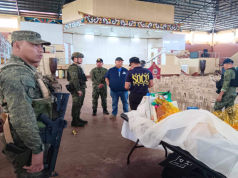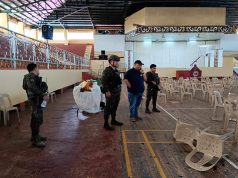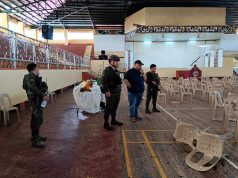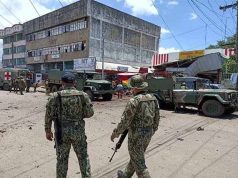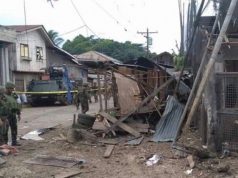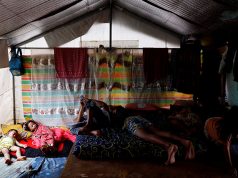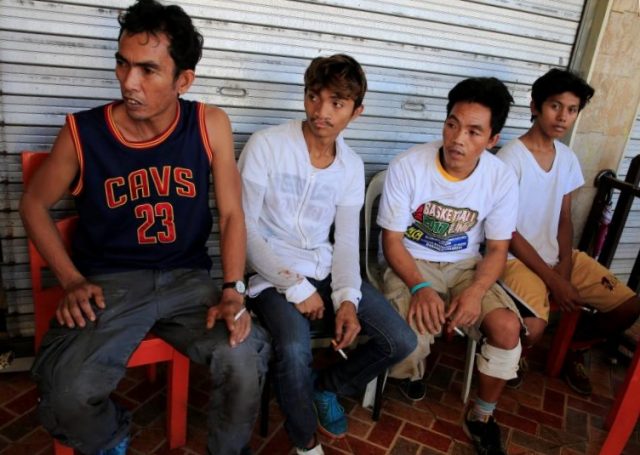
MARAWI CITY – More than three weeks after Islamist militants stormed this Islamic city wracked by the violent standoff with government forces, civilians trapped in battle-torn neighborhoods are being driven to desperate, daring escapes by the threat of capture, starvation and collateral bombing by the military tactical offensive.
As dawn broke on Tuesday, June 13, five police officers and five Christian civilians dashed across the town’s commercial district, ducking for cover from a sniper, to reach a government-controlled area on the western bank of Agus River.
“We ran the last part,” First Officer Lumna Lidasan, 44, told Reuters, indicating on a map a stretch of seven city blocks that leads to Banggolo bridge. “We could see the bridge ahead of us. We had to take cover several times when we saw a sniper.”
‘They are crossing the bridge, taking the risk, because they don’t have any option – either they die inside the house or they die getting out.’ – Zia Alonto Adiong, a local politician managing rescue and relief efforts.
Almost the entire population of more than 200,000 have fled since May 23, when fighters from local groups allied to Islamic State and a few dozen from other countries rampaged through the Muslim-majority town, killing and kidnapping Christians.
The military estimates that, as the siege enters its fourth week, between 300 and 600 civilians remain trapped or being held as human shields in neighborhoods occupied by the militants.
The insurgents – with skilled snipers, rocket-propelled grenades and high-velocity assault weapons, according to Philippine army officials – have repelled a sustained push by the military to retake the town.
Those stuck in their homes have no running water or electricity and many are near starvation, said Zia Alonto Adiong, a local politician managing rescue and relief efforts.
He said that in a text message pleading for help, one family said they had “started to eat their blankets”.
“They are crossing the bridge, taking the risk, because they don’t have any option – either they die inside the house or they die getting out,” he told reporters on Monday.
At least 100 people have made their way out on foot, braving volleys of sniper fire, said Adiong. Others have swum across the river or townside lake to safety, according to relief workers.
Doctors treating those who escaped say they have been struck by the resilience of people who spent weeks surviving in a conflict zone and witnessing horrific violence.
“Some of the stories that stuck were Muslims helping protect Christian workers by letting them borrow a hijab,” said Dr. Gioia Ancheta, head of the psychosocial therapy team.
‘THEY WILL KILL THEM’
As they approached the bridge on Tuesday morning, officer Lidasan could see troops waiting on the other side.
Terrified, but realizing there was no turning back, the police officers and the Christians they had protected for three weeks, raced across the 25-metre stretch with no cover from snipers nesting in the town’s tall buildings.
“We don’t think about ourselves, we think about the safety of the civilians,” said Lidasan, tears welling in his eyes as he recounted the story to reporters later.
Of the five Christians, who were in Marawi on a construction job when the crisis began, one was shot in the leg by sniper fire on Monday night as the group began their escape. Others were injured by cement kicked up by bullets.
“We crawled because snipers were shooting at us. I was wounded by splinters of cement hit by sniper bullets,” said Mateo Velasquez, 33. “My belt bag was hit by a bullet. I thank the money, the coins hit by the bullet.”
The 10 men had been trapped since the siege began in a bungalow with its own cellar. They had basic supplies of dried noodles, canned goods and rice, but had to make a regular “suicide mission” to find water, said Lidasan.
Militants patrolled nearby but they managed to stay hidden until they made their dash for freedom.
Most of those in a larger group of 18 civilians were not so lucky, according to a report from the military on Tuesday.
Militants knocked on the door of a house where they were hunkered down, prompting them all to flee through the back door and head towards the river.
“The terrorists ran after them and indiscriminately fired at them, killing five of the civilians and taking the remaining eight as hostages,” it said.
Click and watch this video report below:




